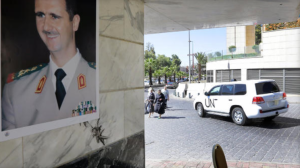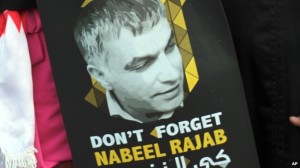By Kathryn Maureen Ryan
Impunity Watch Managing Editor
DAMASCUS, Syria – A group of chemical weapons inspectors from the Organization for the Prohibition of Chemical Weapons came under attack Tuesday while traveling to the site of a suspected chlorine gas attack in Syria. On Tuesday the Syrian Foreign Ministry said six inspectors and five Syrian drivers had been kidnapped in Hama Providence. The OPCW said “a convoy of OPCW inspectors and United Nations staff that was traveling to a site of an alleged chlorine gas attack” when the team came under attack.

A statement published by the State-Run media in Syria said that the Foreign Ministry “confirms that terrorist groups are attempting to undermine the work of the fact-finding mission and are committing terrorist crimes against employees of the United Nations and OPCW.” While it did not provide details about the incidents, the Organization for the Prohibition of Chemical Weapons said the team escaped the attack and that “All team members are safe and well and are traveling back to the operating base.”
The Foreign Ministry said the attack occurred when chemical weapons inspectors were attempting to reach the village of Kfar Zeita where a ceasefire had been agreed between 8 am and 6 pm to allow the team of international chemical weapons inspectors to work in the area. While en-route one of the two cars carrion the team of 11 people was hit by a bomb, forcing the convoy to turn back. Intimately the Foreign Ministry reported that only one of the cars returned successfully.
Abdullah Darwish, A doctor in Kfar Zeita, said the team had been expected to arrive in the village on Tuesday and medical officials had prepared documents pertaining to the alleged chemical weapons attack and had arranged for them to meet with a number of people who suffered during the alleged chlorine attack.
The Chemical Weapons Convention, which Syria joined in October as part of an agreement to give up its chemical weapons program, does not ban states from owning chlorine, but prohibits its use as a weapon. The Syrian government still has roughly 8 percent of 1,300 metric tons of chemical weapons it declared to the OPCW, raising concerns that the regime will miss the June 30 deadline to destroy its chemical weapons stockpile.
The OPCW Director-General Ambassador Ahmet Uzumcu expressed concern about the attack, calling all parties to pledgee cooperation with the mission. He said, “Our inspectors are in Syria to establish the facts in relation to persistent allegations of chlorine gas attacks,” Uzumcu said. “Their safety is our primary concern, and it is imperative that all parties to the conflict grant them safe and secure access”
The pro-opposition Hama Media Centre claimed the attack on the team’s convoy was carried out by Assad’s forces.
For more information please see:
CBS News – Chemical Weapons Inspectors Attacked in Syria – 27 May 2014
CNN International – 6 Chemical Weapons Inspectors Reported Kidnapped in Syria Now Safe – 27 May 2014
Reuters – Chemical Weapons Team in Syria Attacked but Safe: OPCW – 27 May 2014
The New York Times – Chemical Weapons Inspectors Escape Attack in Syria – 27 May 2014


